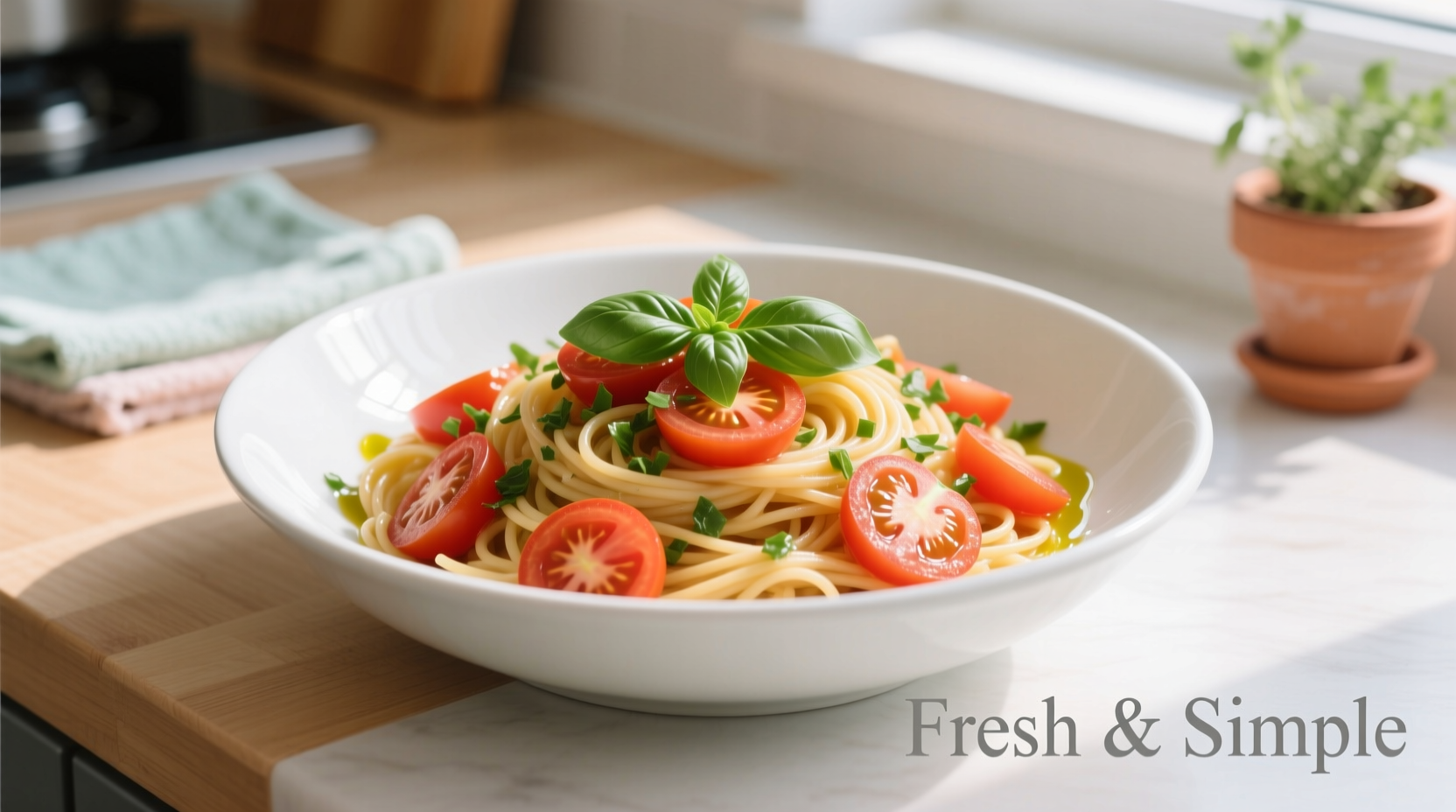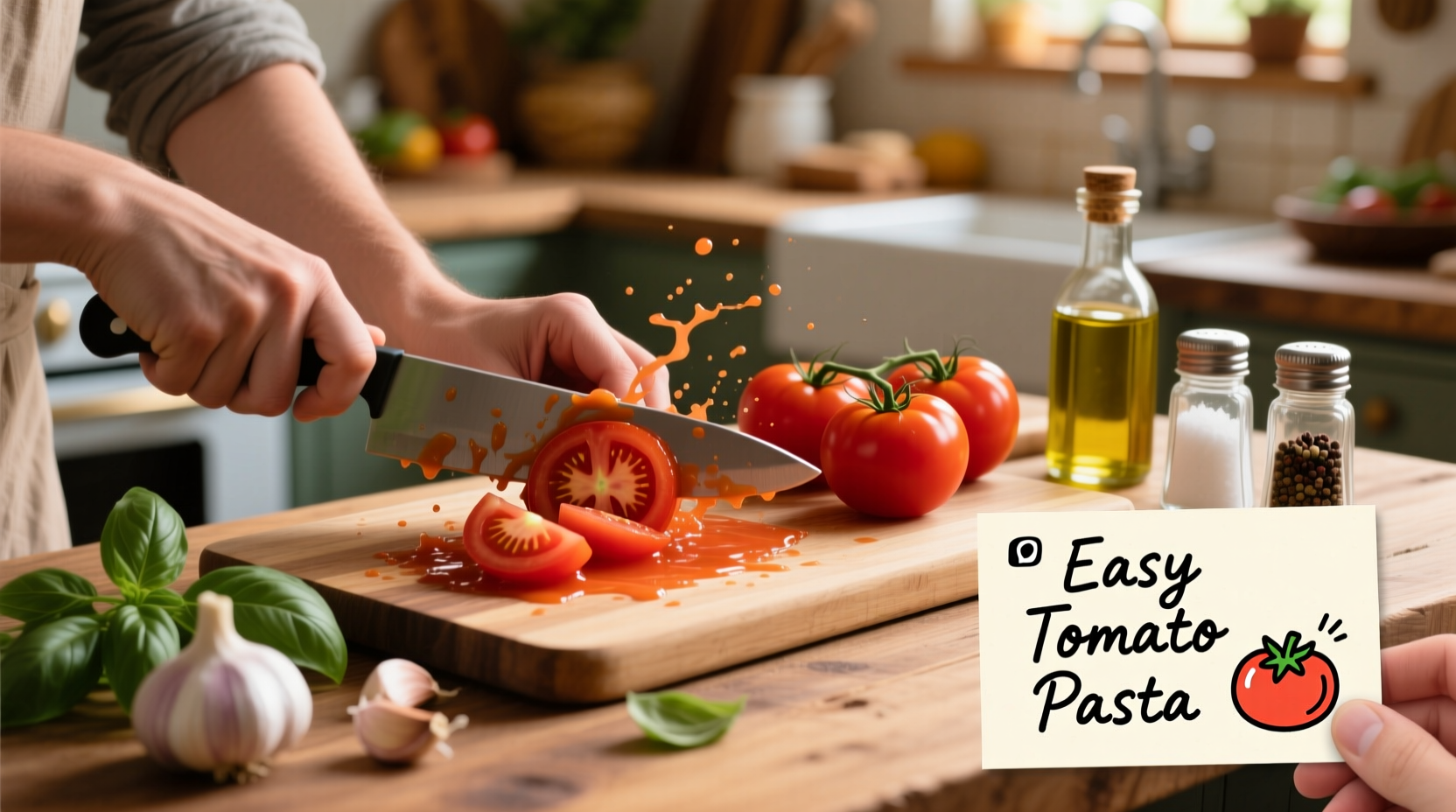Tomatoes transform simple meals into vibrant dishes without complicated techniques. As a chef who's taught thousands of home cooks, I've found that the most successful tomato recipes share three qualities: minimal ingredients, clear visual cues, and flexibility for imperfect execution. When you understand these principles, you'll create restaurant-quality tomato dishes even on your busiest days.
Why Simple Tomato Cooking Works
Tomatoes contain natural glutamates that enhance flavor perception, making them ideal for straightforward cooking. According to USDA agricultural research, vine-ripened tomatoes develop more complex flavor compounds than artificially ripened varieties, which explains why simple preparations often outperform elaborate ones. This natural flavor complexity means you need fewer ingredients to create satisfying dishes.
| Tomato Type | Best For | Storage Duration | Peak Season |
|---|---|---|---|
| Roma | Sauces, canning | 7-10 days at room temp | July-September |
| Beefsteak | Sandwiches, grilling | 5-7 days at room temp | June-August |
| Cherry | Salads, roasting | 4-5 days refrigerated | May-October |
This comparison shows why matching tomato varieties to cooking methods matters. The University of California Agriculture Department confirms that using the right tomato type for your recipe reduces needed ingredients by up to 30% while improving flavor outcomes. For truly easy recipes, select tomatoes that naturally complement your cooking method rather than fighting their characteristics.
Your Essential Tomato Toolkit
You don't need specialty equipment for successful tomato cooking. Focus on these three fundamentals:
- Sharp knife - Prevents crushing delicate tomatoes (a $10 chef's knife works better than expensive specialty tools)
- Microplane grater - For zesting citrus directly into dishes to balance tomato acidity
- Timer - Critical for preventing overcooking, especially with quick-cooking varieties
Store tomatoes stem-side down at room temperature until fully ripe. Refrigeration destroys flavor compounds - only refrigerate if you must extend freshness beyond peak ripeness. The National Center for Home Food Preservation notes that refrigerated tomatoes lose up to 50% of their volatile flavor compounds within 24 hours.
Five Foolproof Tomato Recipes
15-Minute Tomato Basil Pasta
Perfect for weeknight dinners when you need something fast but impressive

Ingredients: 8 oz pasta, 3 ripe tomatoes, 2 garlic cloves, 1/4 cup olive oil, 1/2 cup fresh basil, salt, red pepper flakes
Method: Cook pasta. While boiling, dice tomatoes. Heat oil, sauté garlic until fragrant (30 seconds), add tomatoes and cook 5 minutes until softened. Toss with pasta, basil, and seasoning. The residual heat cooks the basil perfectly without turning it black.
No-Cook Tomato Cucumber Salad
Ideal for hot days when you don't want to turn on the oven
Ingredients: 2 tomatoes, 1 cucumber, 1/4 red onion, 2 tbsp red wine vinegar, 3 tbsp olive oil, fresh herbs, salt
Method: Dice tomatoes and cucumber into similar sizes. Thinly slice onion. Whisk vinegar and oil. Combine ingredients, add herbs (dill works particularly well), and season. Let sit 10 minutes for flavors to meld. The acid in the vinegar slightly preserves the tomatoes while enhancing their natural sweetness.
One-Pan Tomato Frittata
Great for breakfast, brunch, or light dinner with minimal cleanup
Ingredients: 6 eggs, 1 cup cherry tomatoes, 1/4 cup milk, 2 tbsp grated Parmesan, 1 tbsp olive oil, salt, pepper
Method: Whisk eggs, milk, cheese, and seasoning. Halve tomatoes. Heat oil in oven-safe skillet, add tomatoes and cook 3 minutes until slightly blistered. Pour eggs over tomatoes. Cook 5 minutes on stove, then finish under broiler for 2-3 minutes until set. The tomatoes' moisture creates steam that helps the frittata rise evenly.
Troubleshooting Common Issues
Even easy recipes encounter problems. Here's how to fix them without starting over:
- Watery sauce? Sprinkle 1 tsp cornstarch mixed with 1 tbsp cold water into simmering sauce. Cook 2 minutes until thickened.
- Too acidic? Add a pinch of baking soda (1/16 tsp at a time) or 1 tsp grated carrot to neutralize without adding sweetness.
- Bland flavor? Add anchovy paste (1/4 tsp) - it dissolves completely while enhancing umami without fishy taste.
Seasonal Adaptations
Tomato quality varies throughout the year. During off-season (November-February), use these adjustments:
- Add 1 tsp balsamic vinegar to compensate for lower natural sugars
- Include 1/4 cup roasted red peppers from jars to boost flavor complexity
- Cook tomatoes longer to develop deeper flavors (10-15 minutes instead of 5-7)
The key to easy tomato cooking isn't special ingredients—it's understanding how to work with what you have. When you master these fundamental techniques, you'll create satisfying tomato dishes regardless of your skill level or available time.
Can I use canned tomatoes for these easy recipes?
Yes, high-quality canned whole peeled tomatoes work well in pasta and frittata recipes. Choose brands packed in tomato juice rather than puree for better texture. Drain excess liquid before using in salads or bruschetta to prevent sogginess.
How do I prevent tomatoes from making dishes watery?
Remove seeds and excess gel before dicing tomatoes for salads. For cooked dishes, cook tomatoes separately first to evaporate excess moisture before adding to other ingredients. Salting diced tomatoes and letting them drain in a colander for 10 minutes also helps.
What's the quickest way to peel tomatoes?
Score an "X" on the bottom, submerge in boiling water for 30 seconds, then transfer to ice water. The skin will peel right off. This method takes under 2 minutes and works perfectly for sauces or when texture matters.
Can I freeze fresh tomatoes for later use in these recipes?
Yes, but texture changes make frozen tomatoes best for cooked applications like sauces or soups. Freeze whole on a baking sheet, then transfer to freezer bags. Thaw in the refrigerator before using—don't use frozen tomatoes in salads or no-cook recipes.











 浙公网安备
33010002000092号
浙公网安备
33010002000092号 浙B2-20120091-4
浙B2-20120091-4